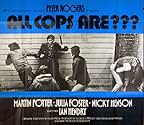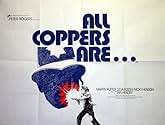Ajouter une intrigue dans votre langueA young policeman and a small-time crook are both involved with the same girl.A young policeman and a small-time crook are both involved with the same girl.A young policeman and a small-time crook are both involved with the same girl.
Avis à la une
I really can't recommend this movie, Sat through it in an early morning bout of insomnia, Set/Made in a working class district of London in the late 60s early seventies., The plot consists of the two men vying for the affections of a an attractive young lady living in a council flat. One a rather obnoxious crim type (I suspect he's meant to be a ladies man but the rather dated attitudes make him seem a sleaze) and one a copper (married as well). I think the film was trying to say something about class relations, male/female relationship etc etc, and while the acting is adequate the stodgy plot never raises it above the mediocre. Pluses are the sixties feel and location that is like a little window to a vanished world & lots of street scenes of London at this time, I think the large power station which dominates the area where the characters live is now a modern art gallery.
All Coppers Are isn't exactly a classic - but it's definitely a product of its time. Produced by 'Carry on' Peter Rogers (with a music score from Gerald Thomas), it's another attempt by them to branch out into something grittier and more realistic - hot on the heels of the movies 'Assault' & 'Revenge' over the previous couple of years.
It has an interesting cast, and lots of good period location filming around Battersea - but in some ways this is the most interesting part of the film. It starts off brightly enough as we get to know the characters, and the story involving a young copper and a petty criminal both vying for the charms of the same girl (played by Julia Foster) sounds promising.
The problem seems to lie with the enforced 'grittiness' - it never really feels authentic, and is more like a parody of working class London at that time. It comes across as a little stilted, and doesn't have the same beating heart at its centre as similar 'kitchen sink' films from previous years (such as 'Alfie'). The story ultimately doesn't seem to reach a satisfying conclusion, send out any particular moral message, or leave any lasting impression.
Having said that, there's still plenty to enjoy if you're a fan of early 70s Brit-movies - it's lovely to see a working Battersea power station in the background of a few scenes, and the cast do their best to liven up quite a thin script.
It's very much a period piece - not the worst of its genre, but far from being the best... it's a fair cop.
It has an interesting cast, and lots of good period location filming around Battersea - but in some ways this is the most interesting part of the film. It starts off brightly enough as we get to know the characters, and the story involving a young copper and a petty criminal both vying for the charms of the same girl (played by Julia Foster) sounds promising.
The problem seems to lie with the enforced 'grittiness' - it never really feels authentic, and is more like a parody of working class London at that time. It comes across as a little stilted, and doesn't have the same beating heart at its centre as similar 'kitchen sink' films from previous years (such as 'Alfie'). The story ultimately doesn't seem to reach a satisfying conclusion, send out any particular moral message, or leave any lasting impression.
Having said that, there's still plenty to enjoy if you're a fan of early 70s Brit-movies - it's lovely to see a working Battersea power station in the background of a few scenes, and the cast do their best to liven up quite a thin script.
It's very much a period piece - not the worst of its genre, but far from being the best... it's a fair cop.
This has the makings of a good film but never quite delivers. it has a good visual sense with some nice camera work and solid location shooting but the story has too many faults.
The plot concerns a working-class criminal and a married cop going after the same girl. The cop and the crim get along well at first but that changes after they know what each other does for a living and it ends in a final confrontation that ends tragically.
The basic fault with the plot is that it's too contrived and relies on far too many coincidences of the main characters running into each other to keep the plotline going. It seems that whenever the cop is on his beat he always seems to run into the criminal and the girl.
Also, the central character is the cop but because the actor playing him fails to inject much charisma into the role the crim comes off as the much more sympathetic and interesting (and better acted) character.
Still, all in all not a bad film.
The plot concerns a working-class criminal and a married cop going after the same girl. The cop and the crim get along well at first but that changes after they know what each other does for a living and it ends in a final confrontation that ends tragically.
The basic fault with the plot is that it's too contrived and relies on far too many coincidences of the main characters running into each other to keep the plotline going. It seems that whenever the cop is on his beat he always seems to run into the criminal and the girl.
Also, the central character is the cop but because the actor playing him fails to inject much charisma into the role the crim comes off as the much more sympathetic and interesting (and better acted) character.
Still, all in all not a bad film.
All Coppers Are... comes across as a slice of life kitchen sink drama of the 1960s. Only it was made in the early 1970s after the worldwide student protest movement of the late 60s.
This was the time when Carry On producer Peter Rogers who also produced this movie started to rebel against the swinging 60s to become a bit of a reactionary.
Set in Battersea. Young policeman Joe (Martin Potter) is married with a baby but gets to have a bit of fun with flighty Sue (Julia Foster) who he met at a party. Joe neglects to mention that he is married and a policeman.
Joe also befriends petty crook Barry (Nicky Henson) who he confesses to about his marital status but no his job.
Barry is also attracted to Sue and they become a couple when they find out more about Joe. Barry is also planning a cigarette warehouse robbery, if only he drove a less conspicuous car. You just know Barry's heist will go wrong and he will come face to face with Joe.
This is story with a thin plot. It was obviously inspired by the French New Wave but it lacks a ballsy approach.
The film's open ended conclusion does it no favours. The protest scene although well filmed seemed to be about nothing apart from young radicals wanting to have a punch up with coppers. It just highlights that the wrong people were involved in the movie as it had no social commentary. Their sympathies were with Barry, being a copper is a hard and dangerous life.
It needed genuine leftist filmmakers to show that times are changing.
This was the time when Carry On producer Peter Rogers who also produced this movie started to rebel against the swinging 60s to become a bit of a reactionary.
Set in Battersea. Young policeman Joe (Martin Potter) is married with a baby but gets to have a bit of fun with flighty Sue (Julia Foster) who he met at a party. Joe neglects to mention that he is married and a policeman.
Joe also befriends petty crook Barry (Nicky Henson) who he confesses to about his marital status but no his job.
Barry is also attracted to Sue and they become a couple when they find out more about Joe. Barry is also planning a cigarette warehouse robbery, if only he drove a less conspicuous car. You just know Barry's heist will go wrong and he will come face to face with Joe.
This is story with a thin plot. It was obviously inspired by the French New Wave but it lacks a ballsy approach.
The film's open ended conclusion does it no favours. The protest scene although well filmed seemed to be about nothing apart from young radicals wanting to have a punch up with coppers. It just highlights that the wrong people were involved in the movie as it had no social commentary. Their sympathies were with Barry, being a copper is a hard and dangerous life.
It needed genuine leftist filmmakers to show that times are changing.
This has the feel of the Sweeney and Up the Junction rolled into one, but doesn't really work.
The poster is a real spoiler. It depicts what is going to happen and makes it obvious the way the storyline is going to go.
Julia Foster talks and acts working class, but has a different outfit in every scene.
It's watchable, but nothing more.
The poster is a real spoiler. It depicts what is going to happen and makes it obvious the way the storyline is going to go.
Julia Foster talks and acts working class, but has a different outfit in every scene.
It's watchable, but nothing more.
Le saviez-vous
- AnecdotesThe street riot scenes were all shot on the exterior Baker Street standing set at Pinewood that had been constructed the previous year for the movie La vie privée de Sherlock Holmes (1970). This street appears in other films/TV series shot at Pinewood around this time too, including The Amazing Mr. Blunden (1972), Carry on at Your Convenience (1971), Amicalement vôtre... (1971) and Alerte dans l'espace (1970). Some of the footage of the riot scenes was later re-used for the 1978 episode Look After Annie (1978) of the TV series Les professionnels (1977).
- Crédits fousThe lettering in the opening title sequence and the closing caption "The End" was in a handwritten font, to mimic the graffiti used for the film's title "All Coppers Are [Bastards]".
- ConnexionsEdited into Les professionnels: Look After Annie (1978)
Meilleurs choix
Connectez-vous pour évaluer et suivre la liste de favoris afin de recevoir des recommandations personnalisées
Détails
- Date de sortie
- Pays d’origine
- Langue
- Aussi connu sous le nom de
- All Cops Are
- Lieux de tournage
- Battersea, London, Greater London, Angleterre, Royaume-Uni(apartment block exteriors/various exterior street scenes)
- Sociétés de production
- Voir plus de crédits d'entreprise sur IMDbPro
- Durée
- 1h 27min(87 min)
- Mixage
- Rapport de forme
- 1.66 : 1
Contribuer à cette page
Suggérer une modification ou ajouter du contenu manquant





























